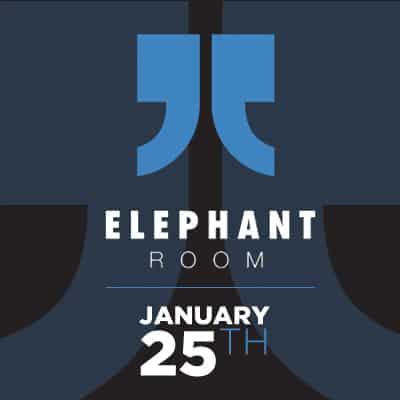Questions After the Elephant Room


I was grateful to attend a simulcast of The Elephant Room yesterday. It’s an event that brings well-known leaders together for honest conversations about differing approaches to ministry.
If you missed the event and want to read a summary of the sessions, Trevin Wax did an excellent job summarizing the day:
The tone of the event was different from last year’s. The build-up was far more controversial, but the actual event seemed less combative. I wasn’t able to attend the entire day, but I enjoyed what I saw.
The biggest controversy about the event was the inclusion of T.D. Jakes as a guest. Some have accused Jakes of being a modalist. Others welcomed the opportunity to hear Jakes explain his views on the Trinity. The controversy resulted in James MacDonald resigning from The Gospel Coalition earlier this week.
Jakes appeared to affirm the Trinity yesterday, and many who attended seemed satisfied. I was encouraged by what I heard, but wished that I had a chance to hear Jakes explain a statement he made: “I believe the latter one [one God existing eternally in three persons] is where I stand today. One God – Three Persons. I am not crazy about the word persons though.” That’s a pretty significant statement. I heard Jakes say this and wanted to know more. Trevin Wax also captured this statement in his summary, although it doesn’t appear in Mark Driscoll’s summary of the same session.
Trevin Wax has suggested that The Elephant Room is a snapshot of contemporary evangelicalism, and I agree.
Here are some questions that I’m wrestling with in the aftermath of The Elephant Room:
How are our tribes shaping us? The Elephant Room exposed divisions within The Gospel Coalition. People seemed to line up in step with their affiliations with groups like Acts 29 and Harvest Bible Fellowship. Evangelicalism seems to be split into overlapping tribes that sometimes clash. How are these tribes shaping us?
How do we handle the size and influence of movement leaders? The speakers at The Elephant Room are movement leaders who influence large numbers of people through their networks. American evangelicalism seems to have produced a fairly large number of leaders whose influence is massive. This is both a danger and an opportunity. How do we take advantage of the opportunities while avoiding the dangers of strong movement leaders?
How do we deal with theological controversies? There were some shots fired at those who raised theological concerns, and those who criticize books like Real Marriage

. “I’m surprised by how hard it was to get people in a room to talk,” MacDonald said. “Frankly I’m embarrassed.” How can we deal with significant theological issues and critique ideas and books in a way that’s constructive and honoring to God? As Ian Clary says, “Genuine theological concerns are not the same as mere stone-throwing, or rhetoric.”
What’s the role of the Internet? I was floored by the number of tweets with the hashtag #ElephantRoom. I simply couldn’t keep up. Much of the controversy took place on the Internet. Confidential emails seem to be leaked online even in Christian circles within hours. I’ve seen two leaked letters this week posted on blogs. How is the Internet shaping the way that we relate to others in the Church?
These are some of the questions I’m wrestling with after The Elephant Room.
What do you think? What questions does The Elephant Room raise in your mind?






